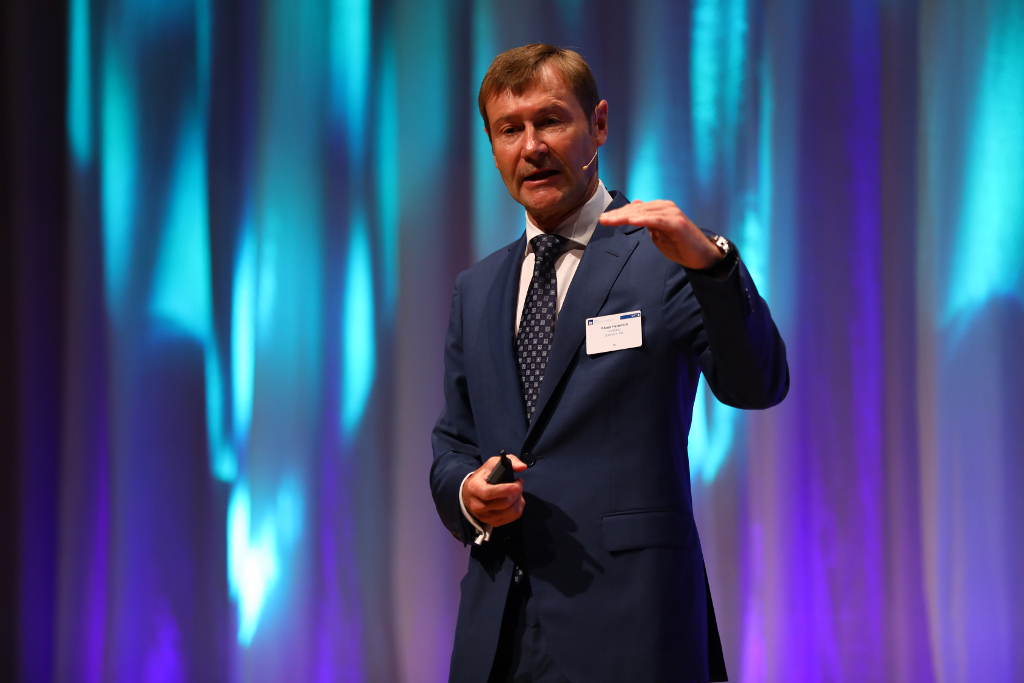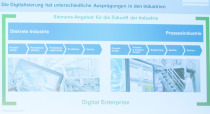Siemens intensifies collaboration with SME to implement Industry 4.0
13.09.2018
 Klaus Helmrich, Managing Board Member of Siemens AG, at the "Forum Deutscher Mittelstand" (German SME Forum) in Stuttgart
Klaus Helmrich, Managing Board Member of Siemens AG, at the "Forum Deutscher Mittelstand" (German SME Forum) in Stuttgart
Quelle/Source: Siemens
• At the "Forum Deutscher Mittelstand", representatives of well-known companies discuss strategies for the future viability of small to mediumsized enterprises
• New forms of collaboration between companies are essential for the digital transformation in the manufacturing and process industries
• Technical prerequisites for digitalization in industry are in place: SMEs can make targeted use of their resources
For the implementation of Industry 4.0, Siemens is relying on even more intensive collaboration with small to medium-sized companies. "Small to medium-sized enterprises are the backbone of the German economy. That's why the digital transformation of small and medium-sized companies is essential for the future viability of Germany as a business location," explained Klaus Helmrich, Managing Board Member of Siemens AG, at the "Forum Deutscher Mittelstand" (German SME Forum) in Stuttgart. "This requires increased collaboration between companies of different sizes - from start-ups to medium-sized companies to large corporations". During the conference, representatives of numerous well-known German companies from the machine and plant manufacturing industry, discussed strategies to ensure the future viability of small and medium-sized businesses.
According to Helmrich, "the successful digital transformation of small to mediumsized businesses requires strategic decisions by top management on two levels. They need to align their portfolio with Industry 4.0 and further develop their internal processes. This also includes training and further education and employees."For example, companies should offer new solutions, digital services and business models, such as "pay per use" models for the sale of machinery and plant. In addition, innovative technologies such as cloud applications, additive manufacturing, flexible handling systems or artificial intelligence must be used. Integrated industrial security measures are essential to increase confidence in IT technologies and minimize cyber risks.
The technical prerequisites for digital transformation are, for example, now in place thanks to the Siemens Digital Enterprise portfolio. Companies of any size and industry can benefit from this with manageable, gradually increasing investment costs. As a result, they can already achieve greater flexibility, shorter time-to-market, increased efficiency and enhanced quality today. According to Siemens, there are concrete examples of customer applications which demonstrate that products, plant and machinery can be developed in up to 30 percent less time. Production efficiency and productivity can be increased by up to a quarter.
One already available platform for digital solutions is MindSphere – the open, cloud-based IoT operating system from Siemens - which helps companies to gain a competitive edge by using data analysis. Users can implement MindSphere with minimal investment and scale it according to their requirements. In this context, Helmrich cited the user organization "MindSphere World", founded in January 2018 and currently comprising more than 50 members (in Germany and Italy), as an example of new forms of cooperation. Its goal is to expand the ecosystem around MindSphere worldwide. The association supports the individual members in developing and optimizing IoT solutions on MindSphere as well as opening up new markets in the digital economy.
"MindSphere World is exemplary for new forms of cooperation between companies of different sizes and industries as well as start-ups and research institutions," according to Klaus Helmrich. "I'm convinced that this kind of collaboration is the key to the success of Industry 4.0."




